Welcome back, my dear friend! Today I’m setting skincare aside to talk about the latest release from one of my favourite parenting authors. Introducing The Starting School Book by Sarah Ockwell-Smith!
Advert: this post contains references to PR gifted products. My views are honest and my own. May contain affiliate links.
As new and clueless parents who gravitated towards natural birth, breastfeeding, bed sharing, and attachment parenting, Sarah Ockwell-Smith books and Gentle Parenting (GP) appealed to my style of parenting right away.
Her books are a goldmine of parenting advice. She has four children herself, a degree in psychology, and has helped countless parents through her work as an antenatal teacher and doula, her books and online channels.
A little of our backstory. My son, Jonah, turns 4 in June and was due to start at primary school in September. However, we have delayed his school start till September 2021, for several different reasons.
The first of these is a speech and language delay his health visitor reported at his 2 year check up. His social skills are behind those expected by his age group. His lack of ability to play imaginatively was noted by a couple of professionals we’ve been in contact with.
Jonah is already at school nursery, but I couldn’t wait to read this book since he’ll be starting “big school” in a little over a year.
So, let’s take a look inside The Starting School Book and see how it can help us transition smoothly towards and beyond this important milestone for children and their parents.
Starting School Book
Who should read The Starting School Book?
There are plenty of books about the practicalities of starting school, but none through the lens of a gentle parent. What is a gentle parent? From Sarah’s blog, gentle parenting aims to follow the natural rhythm of children without bribing and coercion, punishments or rewards. Starting from a place of connection, it aims to raise calm and happy children who have empathy for others.

Whether you identify as a gentle parent or not, The Starting School Book is a guide for parents of school age children who are about to start or who have recently started at school. It’s packed with helpful advice for each stage of the process.
The moment you start thinking about your little one’s school place, you should read this book! But you’ll find it helpful even if your child has already started school and you need help with the transition.
I wish I’d read it before Jonah started school nursery last September – I could’ve prepared him much better. For some reason I’m always slightly out of sync with Sarah’s books, and then read them with wistful hindsight once I’ve muddled through!
How can the book help?
The guidance in The Starting School Book includes:
- School starting ages, policies and procedures
- Deciding the best starting age for a summer-born child
- What to look for when choosing a school
- How to prepare your child emotionally and practically
- Common concerns before starting and once started
- Your own feelings and role in the school community
The chapters
Here I’m going to quickly talk about the chapters and the advice that stood out to me.
Chapter 1 – factors that influence children’s learning
This chapter provides an excellent foundation for the rest of the book by helping the reader to understand what influences children’s learning.
The best school years happen when both children and their parents feel happy and engaged with the whole experience.
I love how Sarah touches on Maslow’s hierarchy of needs and how to nurture a growth mindset.
Who influences education?
It could be surprising to learn that school is not necessary for children to learn, and modern day life and society has led to parents doubting their ability to educate their own children. It’s nice to feel that we do have the skills to educate our children, because there is so much to learn outside of a classroom setting.
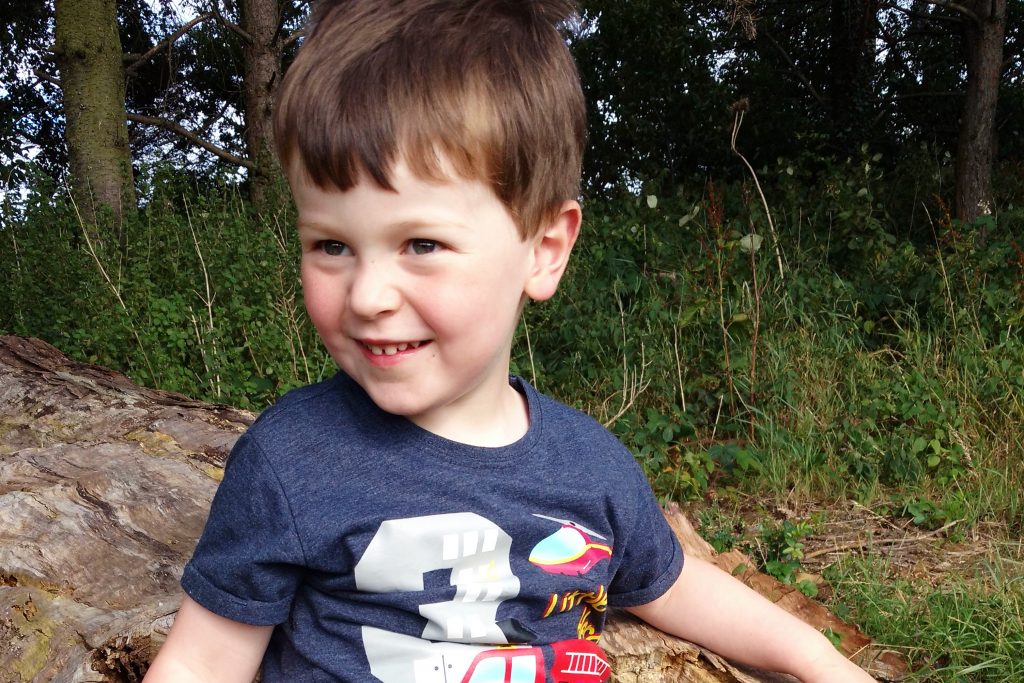
I was so worried about Jonah being stuck in a classroom – I know he’s not ready for that yet. But I was pleased to learn from the book that in early years education, this is definitely not the case!
Early learning should be hands-on, messy, fun and active, incorporating nature and the outdoors as much as possible.
Sarah includes the stages of learning that broadly apply across age groups and are incredibly useful to know! Having two children across different stages can be a challenge!
Starting age
This section looks at starting age pros and cons. It touches on the links between starting age and mental health. Because Jonah is a summer baby and has SEN we were able to keep him back a year. He will be 5 when he starts formal schooling.
Worried about literacy? I was relieved to learn that those children who start learning to read and write later catch up quickly.
And according to the book, a recent government study found that delaying school entry for summer-born children in England has little impact on their academic achievement.
As Sarah says, you will probably know whether your child is ready – we certainly do know Jonah isn’t and his nursery teachers advised this too.
Chapter 2 – school starting ages, policies and procedures
This chapter aims to demystify the application process, and it certainly does help. I feel like I got a head start on this before reading the book, since I have a lovely mummy friend who is a teacher!

As complete newbies to anything related to school, we were aware we could look up schools and read Ofsted reports. But my friend told me that the scores don’t give the entire picture. Some schools are marked down but that might not be for academic or social reasons. It’s worth reading more into, and the book myth busts well-meaning but incorrect ideas that you may have heard on the grapevine!
For children being delayed because they’re a summer baby, it’s important to know the school’s policy on which class your child will enter into when they begin. Will it be Reception, or Year 1? I’d prefer for Jonah to start at Reception class, and I’ve had several friends mention this to me, so it’s worth passing that on here.
Chapter 3 – choosing a school
This chapter really nails the process of choosing a school.
We already knew that we didn’t want Jonah to start at school nursery then move to a different school at age 4-5. And securing a nursery place at school doesn’t guarantee a school place.

Luckily, being in the catchment area for one particular school guaranteed him a place there. Still, we had a little deliberation when selecting a school for Jonah since we had another school in our sights, but needed a feel for it first. One was closer and could be walked to. It also seemed to have a stronger speech and language service.
These were our 4 most important deciding factors:
- Was he guaranteed a place so he wouldn’t have to move from school nursery to a different school?
- Could we walk to the school in 20 minutes?
- Did the school have a strong speech and language service?
- What was our gut feeling about the school? Did Jonah feel happy and secure there?
What I loved reading in this section was that Sarah had no qualms sending her children to a regular state school.
I am lucky enough to live in an area with excellent state schools that meet my children’s needs.
Parents have to find the most important factor to them when choosing a school. Sometimes, choice of school is not within our complete control – we can only indicate preferences.
Getting a feel for the right school
Yet my first impressions of Jonah’s school were not so favourable! Looking at Jonah’s school from the outside, we were put off. But when we visited and spoke to his teachers we knew it was right for him! Of course, this was just the nursery setting, but since starting we’ve seen how this applies to the whole school. Jonah was so happy there, even from his initial visit!

One thing that concerns us is the secondary schools in our area – I must admit I’m not very happy with the choices. I think I need to do more research, though. It seems such a long way away, but Sarah does say you can save a lot of hassle further down the line by considering secondary school while choosing a primary school.
I think you’ll enjoy the massive list of questions Sarah has compiled to ask on open days – there’s no way you could think of all these things on your own without the book! So useful!
This chapter contains very interesting information about Ofsted and why all is not what is seems with their “outstanding” score.
Chapter 4 – preparing your child to start school
Do you think that preparing your child for school means making sure they can write their name, or know how to count to ten? Incorrect! Preparing for school doesn’t mean readying them academically, more preparing them to be independent and continuing to do fun and hands on things together at home.

The book contains amazing tips for physical prep before school. Like getting your child to cross his or her legs. Why did I never think of this before Jonah went to nursery? School loves it because it takes up less space and it’s less of a trip hazard. Getting Jonah to do it though? Not so easy – Jonah mostly loves to sprawl out!
Sarah makes the very valid point that the months leading up to starting school should be spent reading, talking, playing in nature, cooking, and singing with them. Emotional preparation can only go so far since young kids can’t grasp the concept of future in the same way adults do. But normalising school is something you can do every day.
Chapter 5 – the first day and settling in
This chapter covers the big day and subsequent days and weeks. I found the advice on bedtime routines really helpful. It’s so important to have clear boundaries and signposts at bedtime, although we don’t always do things at the same time. Winding down from screens is something we’ve always found hard, since we work and play on our own screens so much. But a 2 hour wind down time makes a lot of sense and we’ve started implementing this already.
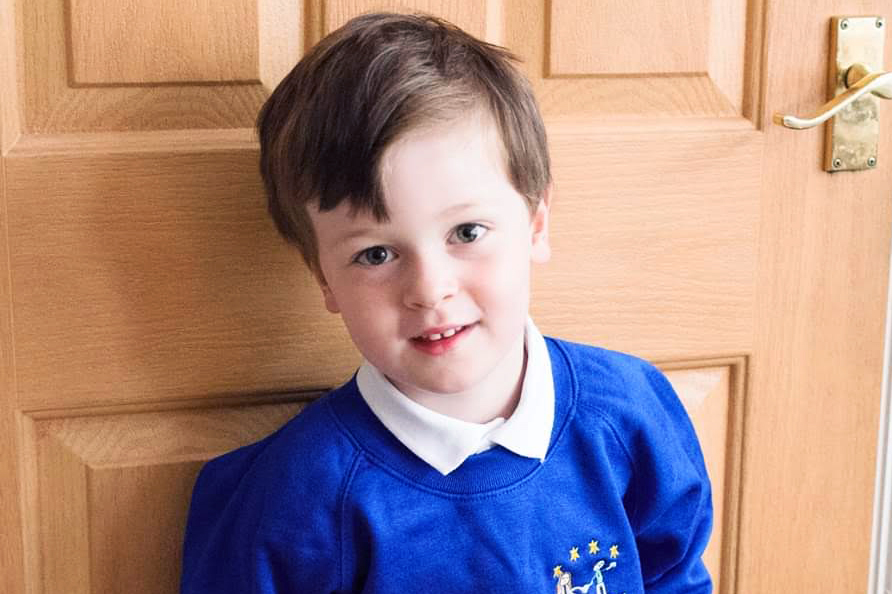
Loved the part about reconnecting at the end of the day without overwhelming a tired child! Too often I fire questions at Jonah about his day at nursery. At school, I think he’ll be even more tired, so I’m just going to focus on reconnecting.
I love how Sarah has covered the very important issue of dealing with your own feelings surrounding this great change. I can imagine myself feeling strange for the first few weeks after Jonah starts big school! But I’m so excited for him to reach this milestone – meeting new friends and rising to new challenges.
Chapter 6 – common concerns
This chapter aims to identify and ease any concerns you or your child have – both physically and emotionally.
We definitely had challenges when Jonah started nursery. He was really tired, as I think most children are when starting school nursery. In the afternoon he really wasn’t up for much! Most of his day after nursery is spent relaxing, seeing family, and playing – I try not to put too much pressure on him.

Also because he has SEN, we’ve already started the long and lengthy process of diagnosis. His next appointment with a paediatrician is in June. His teachers know Jonah needs extra support – they spotted it early on. He probably won’t get this support until a few years into his schooling, but this is typical and the best we could do.
Chapter 7 – the school community and you
Chapter 7 includes how parents fit into the wider picture.
The way in which parents and carers relate to the school staff and community as a whole is just as important to the child’s happiness and success.
Sarah talks about what to do if the school’s discipline methods don’t fall in line with our own as parents. This struck a painful chord with me since I was punished at secondary school for attendance while my parents were divorcing and it felt like my world was falling apart. It was a different time back then!
And I don’t find reaching out socially very easy – this section has given me good ideas to try to gel in the school community and not let my troublesome secondary education colour my ability to join in.
Chapter 8 – looking to the years ahead
As the chapter title suggests, this chapter looks to the future. I like the section that provides tips on raising an inspired learner. I’m going to put the tips into practise with Jonah. Because although my husband and I are academic, Jonah simply isn’t. I know about learning styles so I’m hoping these will come into play for him at school.
Chapter 9 – what teachers (and parents) wish parents knew before starting school
Love, love, love this chapter which comprises quotes from teachers and parents. It really helped me to see things from the perspective of teachers. They do an amazing job, educating children and their parents sometimes too (me included!)
Final thoughts on The Starting School Book
Before reading The Starting School Book, I was a bit worried about Jonah starting school next year. But this book has helped me understand how to make things easier by preparing. We’ve got some great ideas for role playing and conversation starting!
The book has really put my mind at ease about making the right choices for my son. I love how Sarah mixes anecdotal advice with rock solid evidence, and hands the power back to parents. It’s okay to trust your parental spidey-sense! You don’t simply pass your kid over to the school system – you play an active role at all stages.
When your child starts school, there’s so much to worry/think about but the book makes it easier to understand. What I love about Sarah’s books is the recognition that all changes are easier with emotional and physical preparation. And that physical preparation often feeds emotional preparation.
A definite must read for any parent with a child about to start school! As with all Sarah’s books, reading them is such a worthwhile investment.
The Starting School Book by Sarah Ockwell-Smith
Is your child starting school soon? Let me know in the comments!
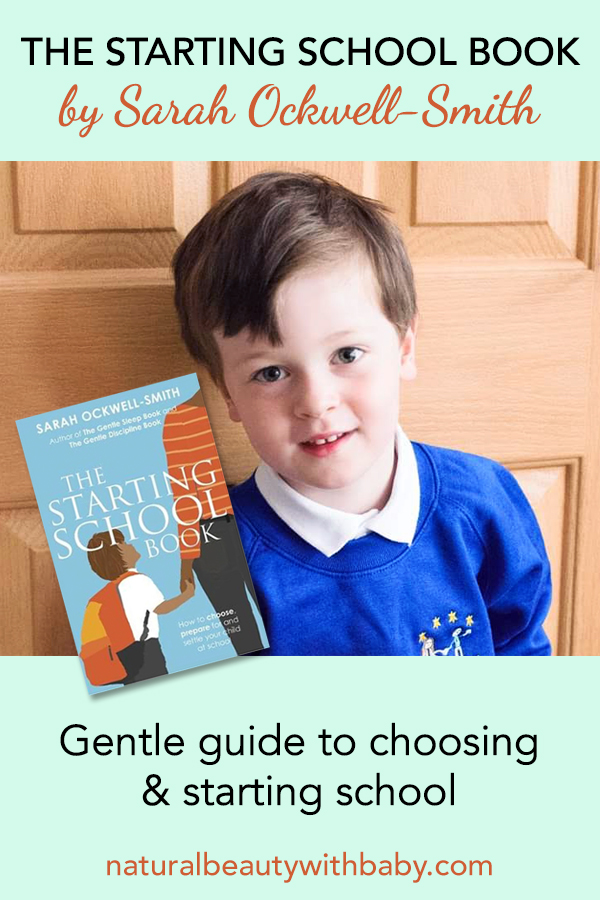
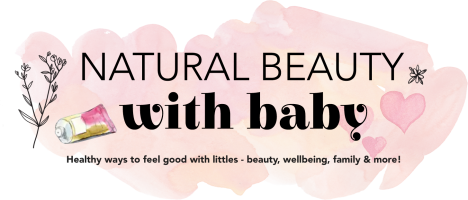
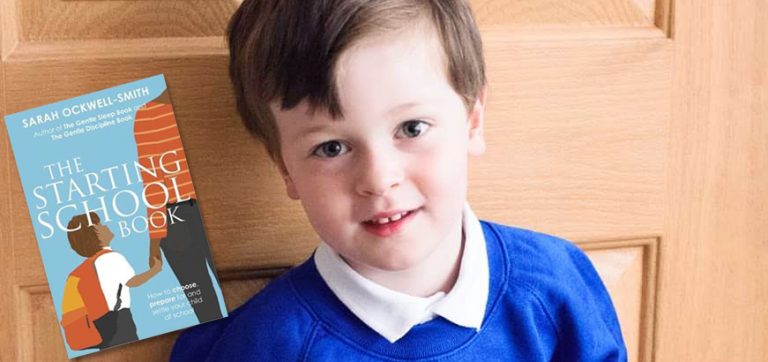



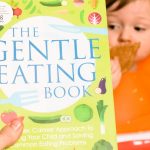

4 Comments
I had never heard of the concept of a “Gentle Parent” before but it’s such a great approach! I will definitely look more into this book too and tell my husband about it.
This sounds like such a great book! I’ll have to check it out!
So interesting. I’ve never heard of gentle parenting before, but I’m sure so many parents use this form of parenting. More parents should read this book!
This sounds like such a great book. I was super unprepared for Oscar going to school, which meant that he was too. He hated me for months for leaving me somewhere he didn’t want to be. We laugh about it now but it was horrible at the time. I wish I’d had a book to help me prepare him for such an important journey in his life.
Louise x